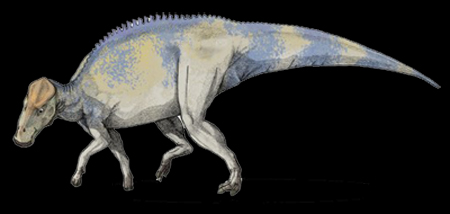
Brachylophosaurus was one of the oddest duckbilled dinosaurs in the Late Cretaceous. It was discovered and named by Charles Sternberg of Ottawa, Canada, in 1953. Normally it was similar to other hadrosaurids.
Brachylophosaurus had many useful and replacement teeth and ducklike snout. But it had a broad, flat and shieldlike crest on top of its head, straight above its eyes. The upper beak of Brachylophosaurus was bigger and broader compared to that of other duckbilled dinosaurs and it also turned down where the horny covering was attached. The lower jaw had a predentary bone that was covered by a horny beak. Brachylophosaurus had very long arms. It’s about 20 feet long and 2 tons.
Since it was discovered in the early 1950s, a number of tremendously well preserved Brachylophosaurus remainder has been excavated. In 2003, a specimen, named Leonardo, was privileged by the Guinness Book of Records as being "the top conserved dinosaur remains in the world." The certificate went on to say, "roughly 90 percent of the Leonardo body is covered with fossilized spongy tissue." Paleontologists value such dinosaur "mummies," while they grant rare tissue samples.
Paleontologists in 2003 were astonished to discover the dinosaur suffered from cancer. They found at least four forms of the tedious disease in copious Brachylophosaurus skeletons. Cancer appears to have been uncommon in other dinosaurs, or maybe even limited to this species. Experts aren’t sure why, but they guess heritable or ecological factors were to blame.
Source from great site: http://www.rareresource.com
Read more interesting topic about dinosaur fossils.

0 comments:
Post a Comment